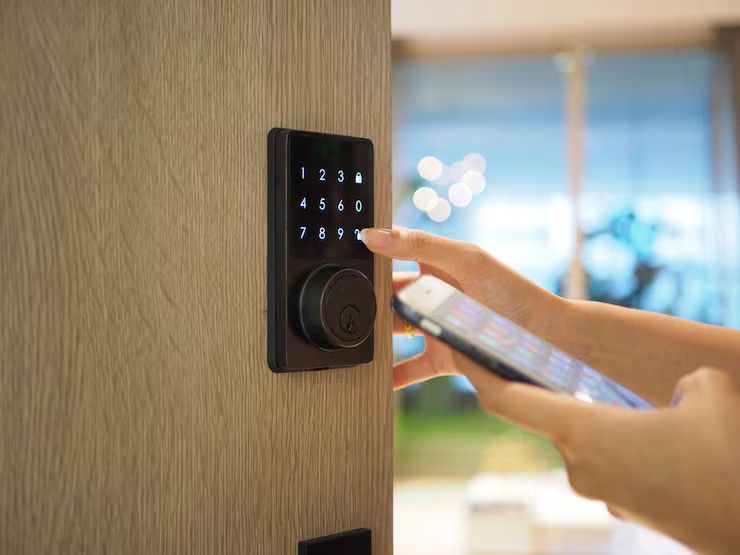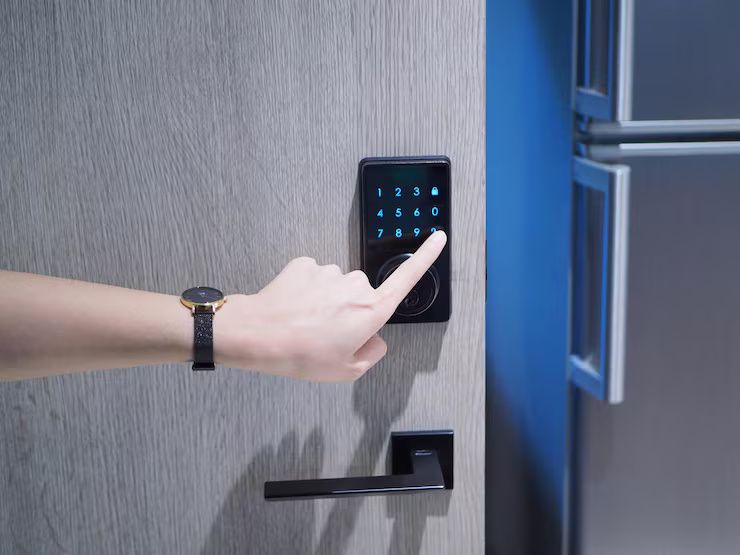Electronic locks are modern security devices that use digital authentication methods, such as keypads, RFID cards, biometrics, or mobile apps, instead of traditional mechanical keys. They were developed to address the limitations of conventional locks—such as lost keys, lock picking, and difficulty in managing multiple access points.
The technology emerged from advancements in electronic access control systems in the late 20th century and has evolved to become more affordable and user-friendly. Today, electronic locks are widely used in residential buildings, offices, hotels, and government facilities.

| Authentication Method | Example | Security Level |
|---|---|---|
| Keypad Code | PIN entry | Medium |
| RFID Card | Contactless smart cards | Medium-High |
| Biometric | Fingerprint/face scan | High |
| Mobile App | Bluetooth/Wi-Fi access | High |
Importance – Why This Topic Matters Today
Electronic locks are becoming essential for modern security needs because they offer:
-
Enhanced Access Control: You can grant or revoke access instantly.
-
Reduced Key Management Issues: No need to duplicate, lose, or replace keys.
-
Integration with Smart Systems: Works with security cameras, alarms, and smart home devices.
-
Audit Trails: Records of who accessed a door and when.
This matters to:
-
Homeowners who want increased convenience and safety.
-
Businesses managing multiple entry points.
-
Hospitality sector ensuring guest privacy and easy key management.
-
Government facilities that require strict access monitoring.
Recent Updates – Trends and Developments
The electronic lock market has seen several trends in the past year:
-
Increased Smart Home Integration (2024): Many locks now connect with AI-powered assistants like Alexa and Google Home for voice-controlled access.
-
Biometric Adoption Rising: Fingerprint and facial recognition features are becoming more affordable and accurate.
-
Cybersecurity Focus: Manufacturers are adding encrypted communication to prevent hacking.
-
Battery Efficiency Improvements: Newer models last longer on a single charge, some even with solar-powered options.
-
Cloud Access Management: Remote access and real-time updates through cloud platforms have become standard in commercial systems.
Laws or Policies – Regulations Affecting Electronic Locks
Regulations vary by country, but common policies include:
-
Data Privacy Laws: In regions like the EU (GDPR) and California (CCPA), biometric data from locks must be stored securely and used only with consent.
-
Building Codes: Some jurisdictions require electronic locks to meet fire safety and emergency egress standards.
-
Cybersecurity Standards: Certain countries mandate compliance with encryption protocols for IoT devices.
-
Hotel Industry Rules: Many countries regulate how guest access data is stored and for how long.
Example:
| Country/Region | Key Regulation |
|---|---|
| EU | GDPR – Data protection for biometric access logs |
| USA (CA) | CCPA – Consumer privacy and consent requirements |
| Japan | IoT Security Guidelines for connected devices |
Tools and Resources – Helpful Platforms and Services
Here are useful resources related to electronic locks:
-
Master Lock Vault Enterprise – Cloud-based access management for businesses.
-
August App – Mobile control for August brand smart locks.
-
Assa Abloy Access Control Solutions – Enterprise-level door control.
-
LockState RemoteLock – Centralized control for vacation rentals.
-
IFTTT Integration – Automate lock functions with smart home devices.
-
Kwikset SmartKey Security – Re-keyable smart locks for home use.
-
Schlage Home App – Manage Schlage smart locks remotely.
-
SmartThings Hub – Integrates locks with other smart home devices.
FAQs – Common Questions About Electronic Locks
Q1: Are electronic locks safer than traditional locks?
Electronic locks can offer higher security due to advanced authentication methods and encrypted communication. However, safety also depends on installation quality and regular updates.
Q2: What happens if the battery in an electronic lock dies?
Most locks provide low-battery alerts. Some have mechanical key overrides or external battery terminals for emergency access.
Q3: Can electronic locks be hacked?
While possible, high-quality locks use encryption and secure firmware updates to minimize risk. Choosing trusted brands reduces vulnerability.
Q4: Do electronic locks work during a power outage?
Battery-powered locks remain functional during outages, while wired locks may require backup power sources.
Q5: Are electronic locks difficult to install?
Many consumer-grade electronic locks are designed for DIY installation, but complex systems in commercial buildings may need professional setup.
Final Thoughts
Electronic locks combine convenience, control, and security in a way that traditional locks cannot match. They have evolved to fit diverse needs—from small apartments to large corporate offices—and integrate with modern smart systems for seamless management.
As technology advances, we can expect even more secure, efficient, and user-friendly models, making them an increasingly valuable investment in personal and organizational safety. Whether you are upgrading home security or managing multiple facilities, understanding the benefits and features of electronic locks helps you make informed decisions.
